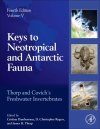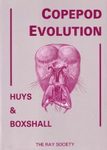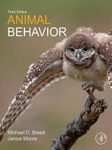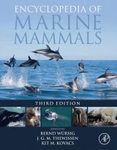About this book
Thorp and Covich's Freshwater Invertebrates, Volume 5: Keys to Neotropical and Antarctic Fauna, Fourth Edition, covers inland water invertebrates of the world. It began with Ecology and General Biology, Volume 1 (Thorp and Rogers, editors, 2015) and was followed by three volumes emphasizing taxonomic keys to general invertebrates of the Nearctic (2016), neotropical hexapods (2018), and general invertebrates of the Palearctic (2019). All volumes are designed for multiple uses and levels of expertise by professionals in universities, government agencies, private companies, and graduate and undergraduate students.
Contents
1. Introduction
Part I
2. Protozoa
3. Phylum Porifera
4. Phylum Cnidaria
5. Phylum Platyhelminthes
6. Phylum Nemertea
7. Phylum Gastrotricha
8. Phylum Rotifera
9. Phylum Nematoda
10. Phylum Nematomorpha
11. Phylum Mollusca
12. Phylum Annelida
13. Phylum Ectoprocta (Bryozoa)
14. Phylum Entoprocta
15. Phylum Tardigrada
Part II
16. Phylum Arthropoda: Introduction and Arachnida
17. Arthropoda: Introduction to Crustacea and the Class Hexapoda
18. Class Cirripedia
19. Class Branchiopoda
20. Class Ostracoda
21. Class Copepoda
22. Class Branchiura
23. Phylum Arthropoda: Crustacea: Malacostraca
Customer Reviews
Biography
Dr M. Cristina Damborenea is a research zoologist at the Consejo Nacional de Investigaciones Cientificas & Técnicas (Argentina), Curator of Invertebrate Collections of Museo de La Plata (Argentina), and Professor of Invertebrate Zoology at Facultad de Ciencias Naturales y Museo, La Plata University (Argentina). She not only specializes in free-living Platyhelminthes but also studies other noninsect groups of aquatic invertebrates as well as aquatic invasive species in South America. Cristina Damborenea created and leads a research group in free-living Platyhelminthes of the Neotropical region. She has numerous peer-reviewed publications focused on the taxonomy and ecology of invertebrates, invasive molluscs, scientific field guides, and studies of the dissemination of scientific knowledge.
Dr D. Christopher Rogers is a research zoologist at the University of Kansas with the Kansas Biological Survey and is affiliated with the Biodiversity Institute, with numerous research projects all over the world. He received his PhD degree from the University of New England in Armidale, NSW, Australia. Christopher specializes in freshwater and terrestrial crustaceans (particularly Branchiopoda and Malacostraca) and the invertebrate fauna of seasonally astatic wetlands on a global scale. He has more than 150 peer-reviewed publications in crustacean taxonomy and invertebrate ecology, as well as published popular and scientific field guides and identification manuals to freshwater invertebrates. Christopher is an Associate Editor for the Journal of Crustacean Biology and a founding member of the Southwest Association of Freshwater Invertebrate Taxonomists. He has been involved in aquatic invertebrate conservation efforts all over the world.
Dr James H. Thorp has been a Professor in the Department of Ecology and Evolutionary Biology at the University of Kansas (Lawrence, KS, USA) and a Senior Scientist in the Kansas Biological Survey since 2001. Prior to returning to his alma mater, Professor Thorp was a Distinguished Professor and Dean at Clarkson University, Department Chair and Professor at the University of Louisville, Associate Professor and Director of the Calder Ecology Center of Fordham University, Visiting Associate Professor at Cornell,and Research Ecologist at the University of Georgia’s Savannah River Ecology Laboratory. He received his Baccalaureate from the University of Kansas (KU) and both Masters and PhD degrees from North Carolina State. Those degrees focused on zoology, ecology, and marine biology, with an emphasis on the ecology of freshwater and marine invertebrates. Dr Thorp has been on the editorial board of three freshwater journals and is a former President of the International Society for River Science. He teaches freshwater, marine, and invertebrate courses at KU, and his Master and Doctoral graduate students work on various aspects of the ecology of communities through macrosystems in rivers, reservoirs, and wetlands. Professor Thorp’s research interests and background are highly diverse and span the gamut from organismal biology to community, ecosystem, and macrosystem ecology. He works on both fundamental and applied research topics using descriptive, experimental, and modelling approaches in the field and lab. While his research emphasizes aquatic invertebrates, he also studies fish ecology, especially as related to food webs. He has published more than 130 refereed journal articles, books, and chapters, including three single-volume editions of Ecology and Classification of North American Freshwater Invertebrates (edited by J.H. Thorp and A.P. Covich) and five volumes in the current fourth edition of Thorp and Covich’s Freshwater Invertebrates.




































